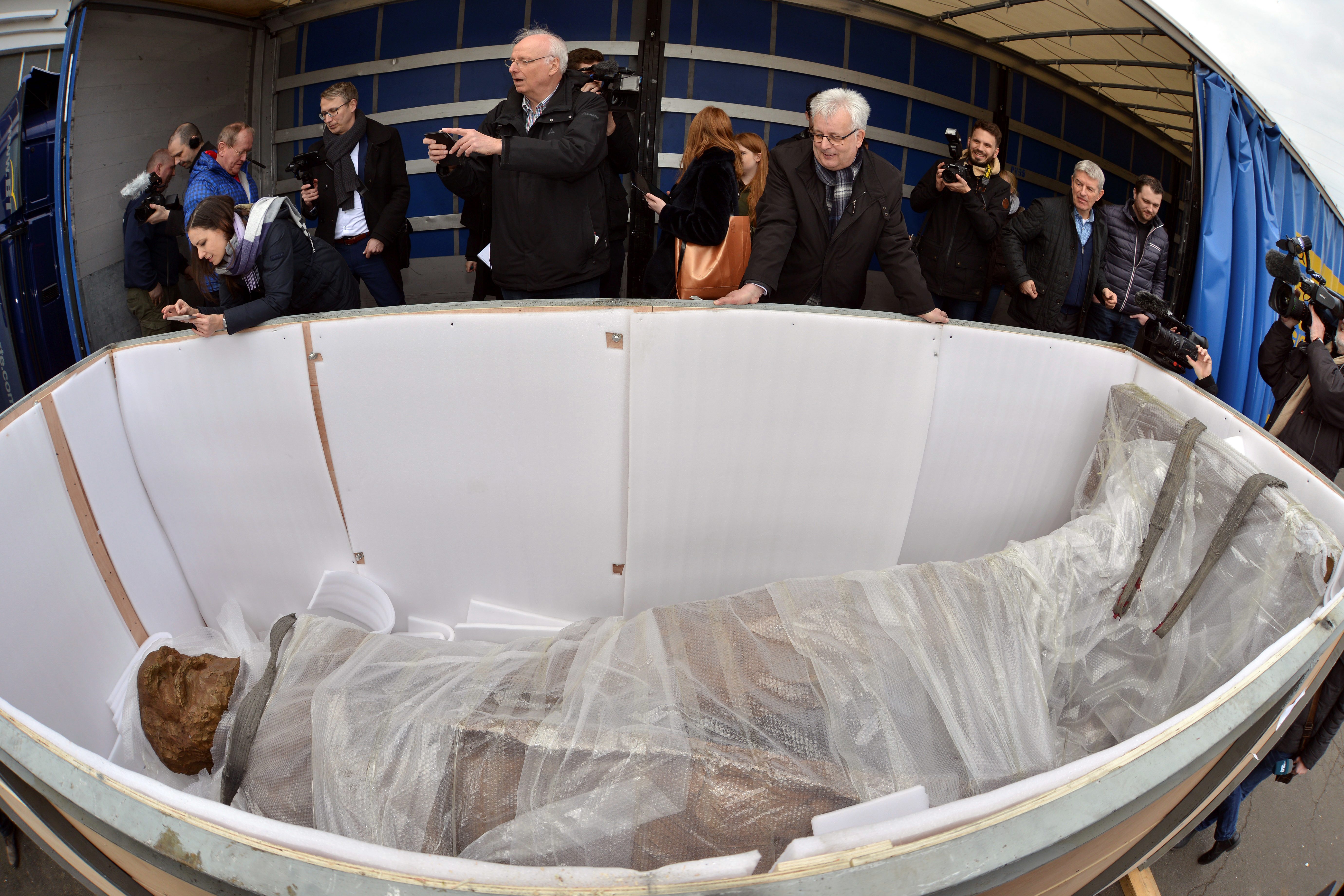
A towering bronze statue of Karl Marx, a gift of China’s communist government, arrived in Germany on Tuesday two months ahead of a celebration honoring the Communist Manifesto author’s 200th birthday
A towering bronze statue of Karl Marx, a gift of China’s communist government, arrived in Germany on Tuesday two months ahead of a celebration honoring the Communist Manifesto author’s 200th birthday in his birthplace of Trier.
But the gift is getting a sharply mixed reaction. Some say the statue honoring the author of “Das Kapital” and the Communist Manifesto celebrates a thinker whose ideas were embraced by some of history’s deadliest regimes. The head of the European Union’s executive arm is taking flak over reports that he may take part in the bicentennial celebrations this spring.
European politicians and opponents of communism have denounced the statue’s installation and other festivities marking the bicentennial. They say the celebration is a slap in the face to millions who suffered under governments acting in the philosopher’s name.
Marion Smith, executive director of the Victims of Communism Memorial Foundation, a Washington-based nonprofit, questioned the wisdom of celebrating a thinker whose ideas have led to “some of the greatest episodes of human suffering in all of history.”
“Every time Marxism has tried, it resulted in abject economic collapse or a repressive police state — or, as we are seeing right now in Venezuela, both,” Mr. Smith said in a statement. “The 200th anniversary of Karl Marx’s birth should not be celebrated, but instead marked by serious historical reflection on the human calamities caused by more than 100 years of communist tyranny.”
Designed by sculptor Wu Weishan, the 14-foot-tall superstructure depicts Marx with a bushy beard, pensive gaze and flowing frock coat. He carries a book in his left hand and steps slightly forward with his left foot.
The statue will be unveiled May 5 in Trier’s Simeonstift Plaza, right next to the house where the revolutionary thinker was born. Other celebrations marking Marx’s 200th birthday will accompany the unveiling.
The Karl Marx House, now a museum, will debut an exhibition, “From Trier to the World: Karl Marx, His Ideas and Their Impact to This Day.”
Jean-Claude Juncker, president of the European Commission, the European Union’s executive arm and one of the Continent’s most well-known leaders, is expected to speak at the opening of an exhibition, “Karl Marx 1818-1883, Life, Works, Time,” at the Basilica of Constantine in Trier.
Daniel Kawczynski, a British member of Parliament who fled the Soviet-dominated communist regime in Poland as a 7-year-old, said an appearance from Mr. Juncker would be in “very poor taste” and encouraged him to turn down the invitation.
“Marxism led to the killing of millions around the world as it allowed a small band of fanatics to suppress the people. We must learn the lessons from this and share with our children,” Mr. Kawczynski told Express.
A spokesperson for Mr. Juncker did not confirm nor deny his plan to attend the Marx exhibition, saying his schedule is released publicly only a week in advance.
Troubled relationship
Trier, a Rhineland town in southwestern Germany best known for its spectacular Roman ruins and architecture, has always had a troubled relationship with its famous son. Marx and his wife, Jenny, were born in the city, and the young scholar and revolutionary spent the first 17 years of his life in Trier.
More than four decades after his death in London in 1883, the leftist Social Democratic Party turned his boyhood home into a museum. Adolf Hitler’s Nazis gutted the site and used it for a party newspaper. The museum was resurrected after Germany’s defeat in World War II and got a post-Cold War boost in interest when the financial crisis shook the world in 2008.
Officials say the site now attracts some 40,000 visitors a year and that the biggest non-German contingent comes from China.
Mr. Kawczynski said erecting a statue of Marx in Germany, which endured decades of division before the Soviet empire collapsed in 1989, is equivalent to “unveiling a statue of Mussolini” in Italy.
Since the fall of the Berlin Wall, Germany has grappled with how to acknowledge a thinker as consequential and controversial as Marx.
The Trier City Council approved the statue’s installment last year on a 42-11 vote, despite objections from some residents who are ashamed of the town’s association with the revolutionary thinker and suspicious of China’s motive behind the gift.
“Setting up a statue of a man who played a major role in the development of communism is a shame and not an honor for Trier,” one resident of Trier told the local newspaper, as reported by the English-language website Deutsche Welle.
But Trier Mayor Wolfram Leibe told the British Telegraph newspaper at the time that the vote “has nothing to do with glorification” of Marx or his ideas. “Those times are over.”
Andreas Ludwig, who heads Trier’s planning department, told the newspaper: “That the largest country on earth has thought about the small town of Trier is great. 150,000 Chinese tourists come every year to Trier — and that could rise even more.”
Beijing also financed a statue of Friedrich Engels, who co-wrote the Communist Manifesto, that was erected in his hometown of Wuppertal in 2014.
Mr. Smith said China’s promotion of Marx is not surprising, given the continuing dominance of the Chinese Communist Party long after other communist regimes were relegated to what Marxists would call the dustbin of history.
“It’s telling that the statue in Trier is being donated by the People’s Republic of China — the largest totalitarian state in the 21st century,” he said. “Right now, Beijing is building a digital surveillance state the likes of which even George Orwell could not imagine, conducting campaigns of outright cultural genocide in Tibet and Xinjiang, and implementing a ‘social credit system’ to rank its more than 1 billion citizens by their commitment to Marxist ideology.”






